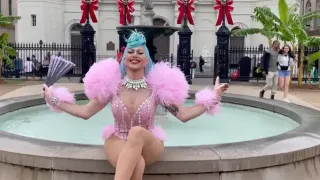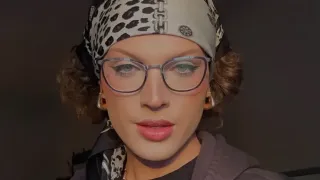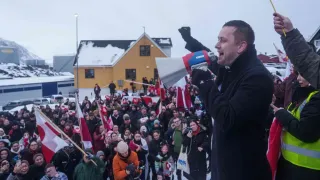March 11, 2014
Germany Rejects Snowden Claim it Bowed to NSA
Michael Cox READ TIME: 1 MIN.
My favorite part of Vinny Cusenza’s website is a section called Behind the Bio, where he answers a deceptively simple question: What’s the most unexpected thing that happened while writing “Blood and Soil?”
His answer; discovering that a Nazi Youth camp once operated not far from his childhood summer home, and then watching the resurgence of American fascism unfold in real time. That sense of uncovering buried truths –both personal and historical– runs deep in his powerful debut novel, a queer historical suspense set in mid-century Appalachia.
Cusenza is a Brooklyn native, a global traveler with a soft spot for Italy, and a seasoned freelance editor who brings a cross-genre sensibility to his writing. “Blood and Soil” is atmospheric and emotionally charged, blending romance and identity with the hard realities of racism, nationalism, and inherited bias. In this interview, we talk about how setting becomes character, how silence can be survival, and how queer storytelling can be both reckoning and reclamation.
Michele Karlsberg: Blood and Soil is such a vivid title, with both historical and emotional weight. How did you come to choose it, and what does it signify in the context of the novel?
Vinny Cusenza: The book’s title evolved over time, and as the story’s layers of meaning revealed themselves to me, so did the right name for this project. We have three mutually distrustful communities occupying the same land, in an isolated swath of Appalachia. “Blood” conveys the racial and ethnic division and animus among these siloed groups, as well as the violence this intolerance leads to.
Shadowing all of this is a terrible secret that some locals are desperate to keep buried—their Nazi past right here, in America. What finally settled the title for me was knowing that “blood and soil” was a rallying cry in Hitler’s Germany.
The story takes place in mid-century Appalachia, a time and place rife with social tension. What drew you to that specific setting for a queer historical suspense novel?
From my own experience there, I knew that the inhabitants of this landscape could provide me with a richness and complexity of human experiences that would fuel the story: the dominant group: religious, white working class German Americans whom prosperity had left behind, and who also had suffered extreme persecution in America, which would have been in living memory at the time of the novel; a tribe of multi-racial mountaineers of American Indian ancestry, who lived off the grid and out of site to stay out of trouble.
And finally, the new colonizers, boot-strapping immigrants from the city whose summer cottages in the mountains had cinched their American dream, but who lived apart from the other groups.
The setting itself became a character in its own right, by turn helping and hindering my characters. The sunlit mountains and lakes, the forests and iron mines, raging storms and treacherous whirlpools all augmented the danger, despair, hope, fear, and yearning of my characters and served the story.
The dynamic between Tony and Jake is central to the novel—equal parts tender and volatile. How did their relationship develop for you during the writing process?
My thought experiment was to give Tony and Jake lives with virtually no point of intersection, each of them with their own distinct flavors of self-loathing and bias, and give them a raw physical attraction. Then I added a generous portion of animus and violence in their mountain world, put both men in harm’s way, and stirred. After that, I stepped back and let each character find their way forward.
I knew their chemistry would be volatile, but it was less clear to me at the start how their attraction could cut through all of their differences. It turned out that being outsiders in more ways than gay was the key.
As a debut novelist, what personal or professional experiences most influenced this book, especially its themes of identity, silence, and inherited bias?
First and foremost, my journey from loathing myself at ten to being comfortable in my own skin at 28. In the 1960s, the only guidance I could find for how to be gay was: don’t. The Stonewall Riots happened just across town from me, but I was so closeted, they might as well have been on the moon. Also, I grew up in a white monoculture in my corner of New York City. I had no POC friends until college. My views about nonwhite people were fed to me by the popular culture’s fabrications, distortions, and omissions. All of that was ripe for exploration in my writing.
The book has been described as “a twisty, atmospheric murder mystery” and also a “search for our authentic selves.” How did you balance suspense with deeper emotional and political storytelling?
The suspense and the emotional and political aspects of the story were mutually reinforcing. I subscribe to the late writer Paul Monette’s belief, which I paraphrase here, when history’s lightening rod strikes you, then your art is political; you either embrace it, or run from it, but it must be dealt with when writing about the human condition. In our present age of strongmen, mendacity, and scapegoating, the emotional is political for LGBTQ people. My job as a writer is to allow the suspense to arise from the emotional and political challenges which my characters grapple with.
Given your background as a publishing editor, how did that insider perspective shape your approach to writing, revising, or even marketing Blood and Soil?
A lot of novels have crossed my desk about outsiders finding their way and their voice in the world, from mystery to romance, fantasy, and steampunk, set in every century from the eighteenth to at least the twenty-fifth. What I hadn’t seen was a story about queer characters battling real American Fascism.
Above all, having been an editor and proofreader, I was humbled to find that it’s a lot easier to judge the work of other writers from 30,000 feet, than to write and revise my own!
The Appalachian landscape feels like a character in its own right. Can you talk about your research process and how you captured the region’s beauty and brutality so vividly?
I had a lived experience of that world’s beauty because I’d spent my childhood summers in it. I’d spent time at its lakes, watched countless sunsets, and taken many hikes in these mountains, and so I had a vivid sense memory of this corner of Appalachia.
But there always had been a darker side. As a city kid in these rural hills, it was hard to miss the animosity of some of our WASP neighbors toward my Italian family, delivered with ethnic slurs and cherry bombs. There were also land covenants that barred Jews from owning property.
It wasn’t until I began my research for the novel that I stumbled upon evidence of things far worse than that. A forgotten American Nazi youth camp had been rediscovered, thirty minutes from my parents’ summer bungalow. As I dug deeper, I learned the disturbing history of this home-grown fascist movement, whose camps ringed New York and extended across the country.
Queer historical fiction can be both a reclamation and a reckoning. What responsibilities or freedoms did you feel in writing a story like this, one that centers gay love in a time of intolerance?
Our community has spent the past sixty years or so uncovering our history, after a millennium of erasure. It’s very important to me to keep the memory of our gay past alive, to remind us that there is no final victory over oppression for queer people without constant vigilance, because once again, in real time, we are being erased.
The novel tackles themes of racial injustice and community silence. How did you approach weaving those into a story that also includes romance and personal awakening?
I see Tony and Jake’s struggles with identity and the area’s racial conflict, silence, and othering as inseparable from the story’s romance.
We all carry multiple identities. I lean into this in the conflict between Tony and Jake, because It’s important to our understanding of them that we widen our frame of reference to see their full humanity, in all of its imperfection. If we separate Jake’s queerness from his native, Dutch, African, and Appalachian identity, or from his personal experience of white people, we can’t know what drives him.
We need to grasp that even as Tony’s Italian family isn’t “white enough” in society’s eyes, he nevertheless has internalized the majority culture’s biases about POC. If we don’t know this, we won’t get why he reacts to Jake as he does.
When we consider that being gay in mid-century America meant living in constant fear of complete ruin, we must judge silence and the closet in that time by different standards than we apply today. That invisibility, and hiding behind a false identity, was an appropriate, in some cases essential, survival strategy to cope with the crushing systemic homophobia of the times.
What do you hope readers carry with them after turning the final page of “Blood and Soil?” And can you give us a hint about what you’re working on next?
I hope readers will take with them the notion that each of us carries within us the basest and noblest impulses. Or as Tony puts it, we’re all victims and we’re all guilty.
When we enter this world, we’re taught a set of beliefs, myths, and biases about Us and the Other, which insidiously coheres into a worldview, constantly reinforced by family, peers, figures of authority, and popular culture. If that web of beliefs goes unexamined, we perpetuate everyone’s suffering. Humility demands of us that before we judge others, we acknowledge our own imperfections, and do the hard work to exorcise our own false views.
The key to dissolving this false division between Us and Them is to seek out other people’s stories and learn what we have in common, which usually is just about everything.
The next project I’m sketching out involves a cross-generational relationship during the AIDS holocaust, and one man’s attempt to move forward with one foot planted firmly in the past.
‘Blood and Soil,’ by Vinny Cusenza, $18.95 paperback, $8.99 Kindle, $22 audiobook, Pen & Pencil Press
https://www.vinnycusenza.com/
Michele Karlsberg Marketing and Management specializes in publicity and marketing for the LGBTQ+ community. This year, Karlsberg celebrates 36 years of successful campaigns. http:// www.michelekarlsberg.com






